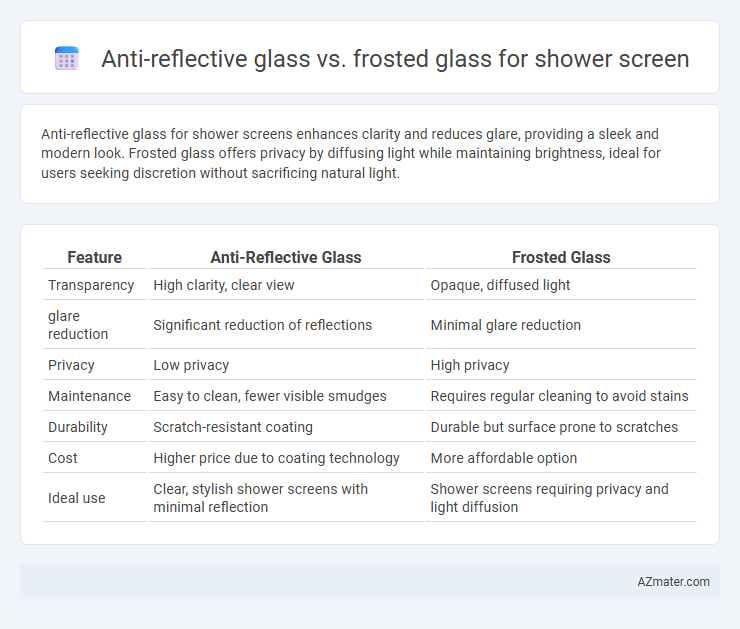Anti-reflective glass for shower screens enhances clarity and reduces glare, providing a sleek and modern look. Frosted glass offers privacy by diffusing light while maintaining brightness, ideal for users seeking discretion without sacrificing natural light.
Table of Comparison
| Feature | Anti-Reflective Glass | Frosted Glass |
|---|---|---|
| Transparency | High clarity, clear view | Opaque, diffused light |
| glare reduction | Significant reduction of reflections | Minimal glare reduction |
| Privacy | Low privacy | High privacy |
| Maintenance | Easy to clean, fewer visible smudges | Requires regular cleaning to avoid stains |
| Durability | Scratch-resistant coating | Durable but surface prone to scratches |
| Cost | Higher price due to coating technology | More affordable option |
| Ideal use | Clear, stylish shower screens with minimal reflection | Shower screens requiring privacy and light diffusion |
Introduction: Choosing the Right Shower Screen Glass
Anti-reflective glass for shower screens enhances visibility by minimizing glare and reflections, creating a clearer and more visually appealing enclosure. Frosted glass offers privacy by diffusing light and obscuring visibility while maintaining a stylish, modern aesthetic. Selecting between these options depends on the balance needed between clarity and privacy in bathroom design.
What is Anti-Reflective Glass?
Anti-reflective glass for shower screens features a special coating that significantly reduces glare and reflections, enhancing visibility and clarity. This type of glass improves light transmission, making the shower area appear brighter and more open while maintaining privacy. Compared to frosted glass, which obscures vision by diffusing light, anti-reflective glass offers a sleek and modern look without compromising transparency.
What is Frosted Glass?
Frosted glass is a type of glass that has been treated with acid etching or sandblasting to create a translucent, matte finish that obscures visibility while allowing light to pass through. Commonly used in shower screens, frosted glass provides privacy without sacrificing natural light, making it ideal for bathrooms. Compared to anti-reflective glass, frosted glass emphasizes privacy and aesthetics over glare reduction and clarity.
Visual Clarity: Anti-Reflective vs Frosted Glass
Anti-reflective glass offers superior visual clarity for shower screens by minimizing glare and reflections, allowing for a clear, unobstructed view of the shower interior. Frosted glass, in contrast, diffuses light through its textured surface, providing privacy but significantly reducing visibility and detail. Choosing between anti-reflective and frosted glass depends on the balance between maximum transparency and privacy needs in bathroom design.
Privacy Levels: Comparing Both Glass Types
Anti-reflective glass for shower screens reduces glare and enhances visibility while maintaining moderate privacy, suitable for users who prefer clarity without complete obscurity. Frosted glass offers superior privacy by diffusing light and blurring shapes, making it ideal for ensuring maximum discretion in bathroom environments. Choosing between the two depends on the desired balance between visibility and privacy, with frosted glass providing higher privacy levels compared to anti-reflective glass.
Maintenance and Cleaning Ease
Anti-reflective glass for shower screens offers superior ease of cleaning due to its smooth, non-porous surface that resists water spots and fingerprints, reducing the frequency of maintenance. Frosted glass, with its textured surface, tends to trap soap scum and mineral deposits, requiring more intensive scrubbing and specialized cleaners to maintain its appearance. Choosing anti-reflective glass enhances long-term cleanliness and minimizes maintenance efforts in high-humidity bathroom environments.
Durability and Safety Considerations
Anti-reflective glass for shower screens offers superior durability due to its scratch-resistant coatings and enhanced clarity, reducing glare and maintaining visibility over time. Frosted glass provides excellent privacy and hides water spots but is more prone to surface scratches and can become cloudy with wear. Safety-wise, both types typically use tempered glass, which shatters into small, blunt pieces, but anti-reflective glass often includes additional protective layers that increase impact resistance.
Aesthetic Appeal in Modern Bathrooms
Anti-reflective glass offers a sleek, clear surface that enhances natural light while minimizing glare, creating a bright and open atmosphere ideal for modern bathrooms. Frosted glass provides a soft, diffused texture that adds privacy and a subtle decorative element, contributing to a sophisticated and minimalist design. Both options complement contemporary aesthetics, with anti-reflective glass emphasizing transparency and cleanliness, while frosted glass emphasizes privacy and understated elegance.
Cost Comparison: Anti-Reflective vs Frosted Glass
Anti-reflective glass generally costs more than frosted glass due to advanced manufacturing processes that reduce glare and improve clarity in shower screens. Frosted glass remains a budget-friendly option, offering privacy with simple acid-etching or sandblasting techniques that are less expensive to produce. Homeowners selecting shower screens must weigh the higher upfront investment of anti-reflective glass against the more affordable frosted glass while considering durability and maintenance costs.
Which Glass is Best for Your Shower Screen?
Anti-reflective glass offers superior clarity by minimizing glare and reflections, making it ideal for shower screens in bathrooms with limited natural light or sleek modern designs. Frosted glass provides enhanced privacy and a soft, diffused light effect, perfect for bathrooms where discretion is a priority. Choosing the best glass depends on whether visibility or privacy is the primary concern for your shower screen installation.

Infographic: Anti-reflective glass vs Frosted glass for Shower screen
 azmater.com
azmater.com